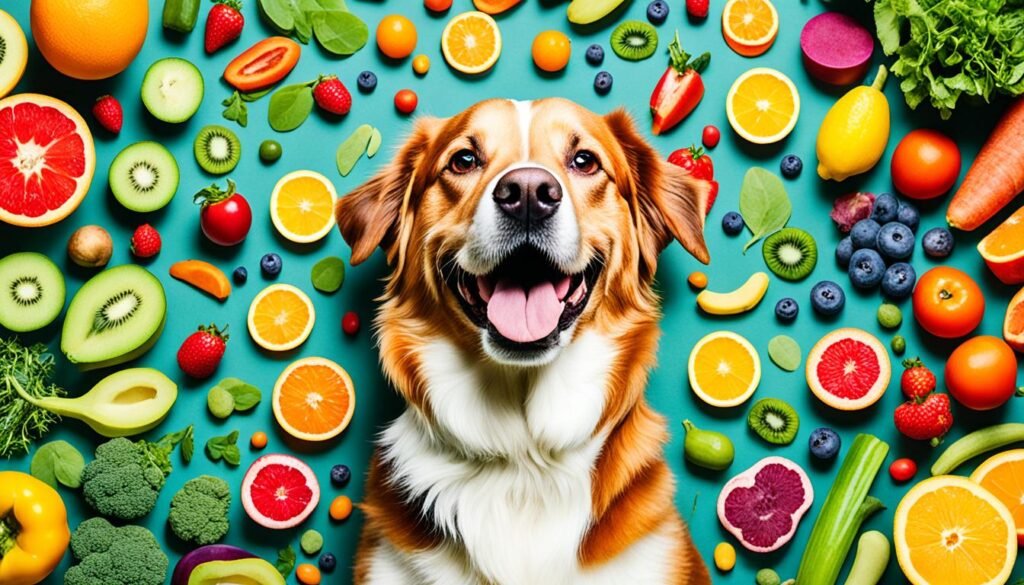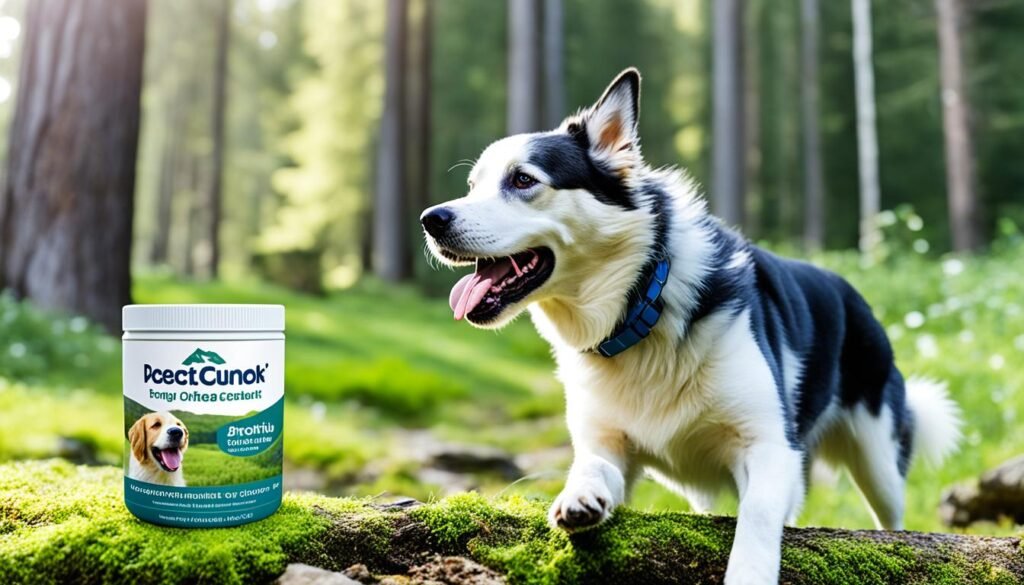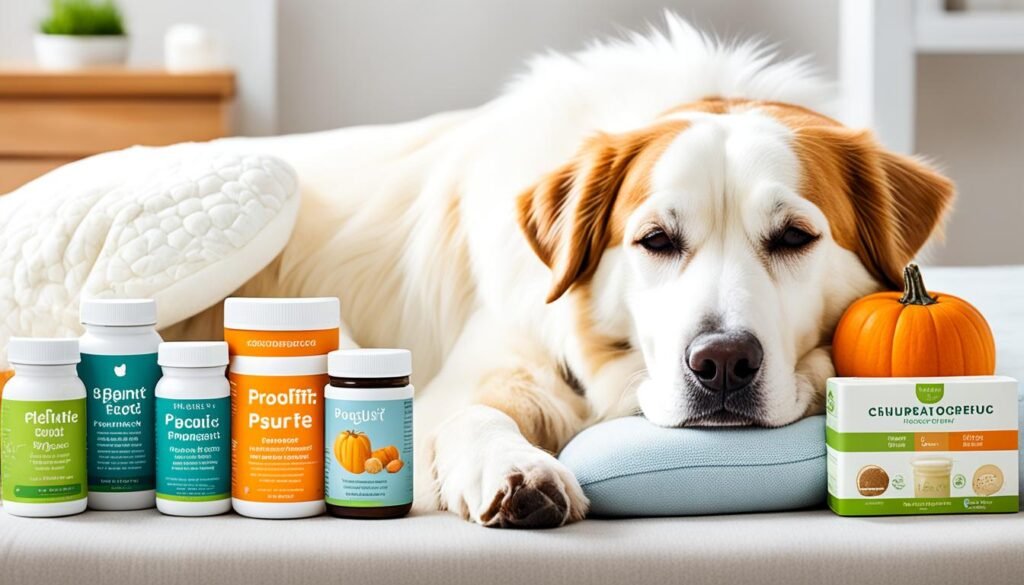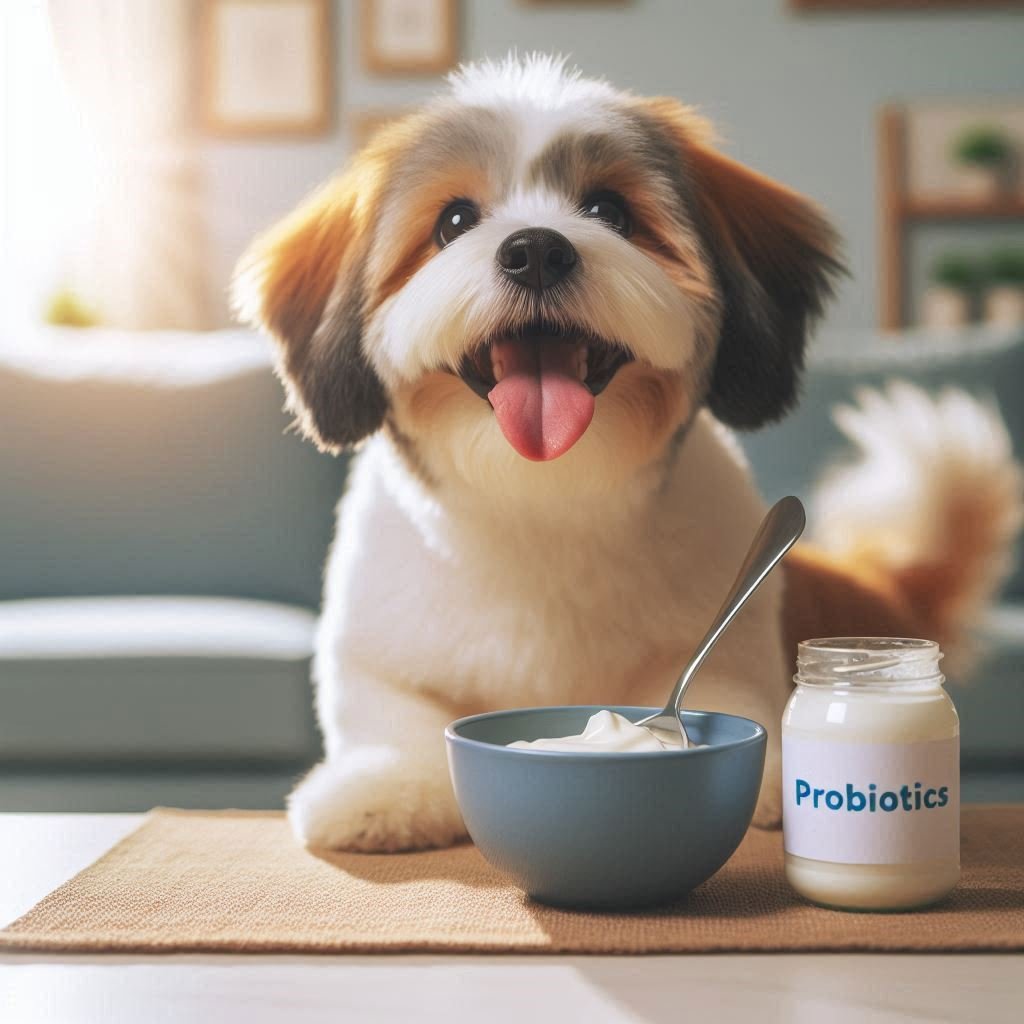Keeping a dog’s gut healthy is key to their overall health. Natural probiotic for dogs give them the good bacteria they need. Foods like Greek yogurt and green tripe are great for supporting their digestive and immune systems.
These foods can be easily added to a dog’s diet to help with digestion and fight off stomach problems. Probiotics also boost a dog’s immunity, help with allergies, and can even make them happier. There are many pet-safe ways to give them these supplements, from homemade treats to special supplements.
By learning about the benefits of natural probiotics and how to add them to a dog’s diet, pet owners can keep their dogs’ guts happy and healthy. This means their dogs will be happier and healthier overall.

Key Takeaways
- Natural probiotics for dogs are foods rich in beneficial microorganisms that support digestive and immune system health.
- Greek yogurt and green tripe are considered the best natural probiotics for dogs, followed by other dairy products, fermented foods, and vegetables.
- Probiotics help with digestion, immune support, oral health, allergy control, and mood improvement in dogs.
- Homemade probiotic treats and supplements can be easily made using natural, dog-friendly ingredients.
- Introducing probiotics gradually and combining them with prebiotics can help maintain optimal gut health in dogs.
What are Natural Probiotics for Dogs?
Natural probiotics for dogs are foods full of good bacteria and yeasts. These foods are key to keeping your dog’s dog gut health strong. Foods like Greek yogurt and green tripe are easy to add to your dog’s diet to help their digestion.
Some top natural probiotics for dogs include:
- Greek Yogurt – It has live, active cultures that help balance good bacteria in your dog’s gut.
- Green Tripe – This is a nutrient-rich organ meat with natural probiotics and enzymes good for digestion.
- Kefir – A fermented dairy product like yogurt, kefir is full of probiotics and great as a pet supplement for dogs.
- Cottage Cheese – A probiotic-rich dairy product that can be a yummy addition to your dog’s meals.
- Lacto-Fermented Vegetables – Foods like sauerkraut and shredded carrots with ginger have natural probiotics.
Adding these natural probiotics for dogs to their diet can boost their gut health and overall health. Always talk to your vet to make sure you’re giving the right kind and amount of probiotics for your dog.
Benefits of Natural Probiotics for Dogs
Digestive Health
Probiotics are key for a dog’s digestive health. They can lessen issues like diarrhea, irritable bowel syndrome, leaky gut, and gas. Foods and supplements rich in probiotics increase the “good” bacteria in a dog’s gut. This helps them digest food better and absorb important nutrients like calcium, iron, and magnesium.
Immune Support
Probiotics boost a dog’s immune system. They make antibacterial compounds that stop harmful pathogens from growing. This keeps dogs healthier and can ease allergies, anxiety, and improve their mood.
Changes in a dog’s gut can cause health issues like poor digestion, allergies, obesity, and bad breath. Adding natural probiotics to their diet can fix the balance of good bacteria. This leads to better overall health and energy.
| Probiotic Strain | Health Benefits for Dogs |
|---|---|
| Bifidobacterium animalis, Bifidobacterium longum | Alleviate diarrhea and digestive issues |
| Enterococcus faecium, Lactobacillus acidophilus | Improve nutrient absorption and gut health |
| Bifidobacterium longum, Pediococcus acidilactici | Reduce allergies and support immune function |
| Bifidobacterium longum, Lactobacillus casei | Decrease anxiety and improve mood |
By using a mix of probiotic strains, dog owners can help their pets with digestion, immune health, and overall well-being.
Top Natural Probiotic Foods for Dogs
Natural probiotic foods are great for your dog’s gut health and overall well-being. Two top choices are
Greek Yogurt
and
Green Tripe
Greek yogurt is packed with probiotics good for dogs. It has lots of Lactobacillus acidophilus and other helpful bacteria. Adding two to three tablespoons to your dog’s food can really help their digestion. Plus, it’s full of protein and calcium, making it a healthy snack.
Green tripe is another great probiotic food. It’s a type of organ meat that’s full of dog probiotics, enzymes, and more. These help keep your dog’s gut and immune system healthy.
There are more natural dog probiotic foods too. You can try kefir, cottage cheese, sauerkraut, carrots with ginger, bananas, apples, and chicory root. Adding these natural digestive supplements for dogs can really help your dog stay healthy.
“Probiotics are more effective as a prevention tool for long-term wellness rather than providing immediate relief for infections.”
It might take a few weeks to see the full effects of probiotics on your dog. So, be patient and keep giving them these dog prebiotic supplements. Feeding your dog foods rich in probiotics is a smart move for their dog gut health in the long run.
natural probiotic for dogs
Natural probiotics are key for keeping dogs’ guts healthy. They help balance the digestive system, boost the immune system, and improve overall health. These good bacteria and yeasts work together to keep dogs feeling their best.
There are many foods that are great for dogs, like Greek yogurt, green tripe, kefir, cottage cheese, and veggies with mild lacto-fermentation. Feeding dogs these foods can help their gut health a lot.
- Greek yogurt is packed with live cultures that help with digestion and boost the immune system.
- Green tripe is full of nutrients and probiotics, helping to keep the gut healthy.
- Kefir and cottage cheese are easy to add to a dog’s diet and are also probiotics.
- Lightly fermented veggies, such as sauerkraut or carrot-ginger, add good bacteria to a dog’s diet.
These foods are easy to find and can be added to a dog’s diet easily. They help with optimal digestive function, immune support, and overall well-being.

“Probiotics contribute to a healthy gut in dogs by promoting a harmonious gut environment, enabling proper digestion, inhibiting the growth of ‘bad’ bacteria and boosting the dog’s immune system.”
Introducing Probiotics to Your Dog
Adding dog probiotics to your dog’s diet can greatly improve their gut health and overall health. It’s important to add these good bacteria slowly to avoid upset stomachs.
Start with small amounts of pet probiotics and increase it over time. You can mix in foods like Greek yogurt, green tripe, and fermented vegetables with their meals. For supplements, follow the package instructions and watch how your dog reacts, adjusting as needed.
It might take a few days to a few weeks to see improvements in your dog’s health. Keep probiotic supplements in a cool, dry place to keep them effective. Adding probiotics to food can also make them more appealing to picky eaters.
Being patient and consistent is crucial when introducing probiotics to your dog. Watch how they react and talk to your vet if you have concerns. Giving your dog the right dog digestive support can lead to a healthier gut and better overall health.
| Probiotic-Rich Food | Recommended Serving Size |
|---|---|
| Greek Yogurt | 1-3 large tablespoons, based on body weight |
| Green Tripe | A few chunks daily for dogs over 6 months old |
| Fermented Vegetables | Start with 1/2 tsp for smaller dogs, 1 tsp for larger dogs |
| Kefir | 1-4 tsp daily, depending on dog size |
| Cottage Cheese | Around 3 oz for a 25-lb dog |
It’s key to add probiotics slowly and watch how your dog takes to them. If you’re unsure, talk to your vet about adding dog probiotics to your dog’s diet.
Safety Considerations
Dog probiotics and pet probiotics can greatly benefit your pet. But, it’s important to be careful when adding them to your dog’s diet. Treat them like any other change in their diet or digestive support.
When adding probiotics, start with a small amount and watch your dog for any signs of upset. This could be diarrhea or discomfort. Their gut might need time to adjust to the new bacteria.
- Avoid giving probiotics to dogs with weakened immune systems or those taking certain medications, as they may be more sensitive to potential side effects.
- Consult your veterinarian before starting your dog on a probiotic regimen, especially if they have any underlying health conditions.
Studies on dogs and probiotics are not as common as those on humans. But, the research shows they can help with digestion and boost the immune system. By being careful and talking to your vet, you can make sure your dog gets the most out of probiotics.

Homemade Probiotic Treats and Supplements
Keeping your dog’s gut healthy doesn’t need to be hard. Making your own probiotic treats and supplements is a natural way to help your dog’s digestion. With just a few simple ingredients, you can make tasty treats full of good bacteria.
Recipes and Resources
Adding plain Greek yogurt, kefir, or fermented veggies to things like peanut butter, sweet potatoes, and coconut milk makes yummy treats. These recipes let you pick the ingredients your dog likes best and needs most.
- Frozen Homemade Probiotic Dog Treats: Combine plain Greek yogurt, peanut butter, and a touch of honey for a creamy, probiotics-packed frozen treat.
- Coconut Milk and Carrot Probiotic Treats: Blend coconut milk, carrots, peanut butter, and maple syrup for a dairy-free, gut-supporting snack.
You can also make your own probiotic supplements at home. Use fermented veggies like sauerkraut or kimchi with bone broth or water. This gives your dog a big dose of good bacteria.
When making probiotics for dogs at home, keep them in the fridge or freezer. This keeps the live cultures strong. Eating fresh, without preservatives, helps your dog stay healthy and happy.
“Probiotics are essential for maintaining a healthy gut, which is the foundation of your dog’s overall health and well-being.”
Probiotic Supplements for Dogs
There are also probiotic supplements for dogs, not just foods. These come as powders, pills, or soft treats. When picking a supplement, choose high-quality, refrigerated ones with live cultures. Talk to your vet to find the right one for your dog.
Probiotic supplements help your dog’s gut health and overall health. They have beneficial bacteria that can fix your dog’s gut balance. This leads to better digestion, stronger immunity, and a healthier coat.
When choosing a probiotic for your dog, make sure it’s made for dogs. Human supplements might not be right for them. Also, pick a high-quality one from a trusted brand with safety and effectiveness certifications.
| Probiotic Supplement | Active Ingredients | Benefits | Serving Size | Price |
|---|---|---|---|---|
| Dog Probiotic Soft Chews | Glycerin, Brewer’s Yeast, Tapioca Flour, Coconut Oil, Pumpkin Powder, Chicory Root, Lactobacillus plantarum, Aspergillus oryzae, L. acidophilus | Supports immune system, enhances digestive function | 2 soft chews daily | $28.99 (regular price $39.99) |
Always talk to your vet before adding new supplements to your dog’s diet. They can give you advice on the best probiotic and how much to give your dog.
Combining Probiotics with Prebiotics
To boost your dog’s health, think about adding dog prebiotic supplements to their diet. These are special plant fibers that feed the good gut bacteria. This helps them grow and do their important jobs.
Many studies have found that probiotics and prebiotics work well together. This combo, known as synbiotics, greatly improves dog gut health. It’s a great way to support your dog’s digestion and overall health.
You can add prebiotic-rich foods like bananas, sweet potatoes, oatmeal, and broccoli to your dog’s meals. These foods are great pet remedies that work well with probiotics. Together, they help the good gut bacteria grow and thrive.
- Prebiotics give probiotics the food they need to grow and work better.
- Probiotics make good stuff from the food your dog eats, helping the gut work better.
- These microbes make vitamins and short-chain fatty acids that your dog can’t make itself. These help with digestion, cell strength, and immune health.
By using dog probiotics and dog prebiotic supplements together, you can keep your dog’s gut healthy. This leads to better digestion, better nutrient use, and a strong immune system for your furry friend.
Ongoing Gut Health Maintenance
Keeping your dog’s gut healthy is a long-term effort. It’s key to add foods rich in probiotics and supplements to their diet when needed. This helps keep their digestive system in good shape.
Studies show that having a pet can make people and pets happier. This shows how important it is to keep dogs’ gut health up. Probiotics help by making the gut barrier stronger and boosting immunity.
To keep your dog’s gut healthy, watch their overall health and how their digestion is doing. If you notice any changes, adjust their diet and supplements. Talking to your vet can give you the best advice for keeping your dog’s gut healthy.
Probiotic-Rich Foods for Dogs
- Greek Yogurt
- Green Tripe
- Kefir
- Fermented Vegetables
Probiotic Supplements for Dogs
| Product | Probiotic Strains | CFU Count |
|---|---|---|
| Probiotic Everyday | Proprietary Blend | 1 Billion |
| Vetri Mega Probiotic™ | 7 Strains | 7.5 Billion |
| Vetri Probiotic BD™ | Proprietary Blend | Not Specified |
| Fast Balance GI Paste | Proprietary Blend | Not Specified |
Always talk to your vet before adding new supplements or changing your dog’s diet. They can give you advice on the best way to keep your dog’s gut and overall health in check.
“Maintaining your dog’s gut health is an ongoing process that requires a balanced diet, regular exercise, and stress management.”
Conclusion
Natural probiotics are a great way to help your dog stay healthy and happy. Foods like Greek yogurt, green tripe, and fermented veggies can boost their gut health. They also help with digestion and keep their immune system strong.
Adding natural probiotics for dogs to their diet can really change things for the better. It’s good to mix them with foods that have prebiotics too. Always talk to your vet to get the best advice for your dog.
More and more people are turning to dog probiotics for their pets. Adding these pet probiotics to your dog’s diet can make a big difference. It helps keep their gut healthy and supports their overall health.
By using natural probiotics, you’re taking a big step towards better health for your dog. This approach can really improve their life in many ways. It’s a great way to help your dog live a happier, healthier life.


